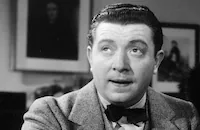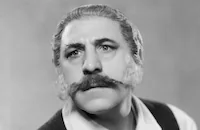Dust Be My Destiny

Brief Synopsis
Cast & Crew
Lewis Seiler
John Garfield
Priscilla Lane
Alan Hale
Frank Mchugh
Billy Halop
Film Details
Technical Specs

Synopsis
Joe Bell, who has become a hardened cynic because he has served a prison term for a crime he did not commit, is searching for a place to settle down when he is picked up as a vagrant and sentenced to a county work farm. There, he meets Mabel Alden, the sympathetic stepdaughter of the brutal and drunken prison foreman, Charley, and the two fall in love. When Charley catches his daughter with Joe, a fight ensues in which the foreman is rendered unconscious. Panicked, Joe and Mabel flee the work farm and cross the state line, where, unable to afford the cost of a wedding, they agree to accept a free ceremony on a public stage. Immediately after completing their vows, they learn that Charley has died and that Joe is accused of his murder. Fearful that their marriage publicity will lead the police to them, they must constantly be on the run from the law. During their travels they are befriended by Nick, who gives them a job at his diner, but when the police track them down, they hit the road once again. Joe is so desperate that he is on the verge of pawning his one possession, his camera, when he stumbles upon a bank robbery and captures it on film. Impressed with the pictures, newspaper editor Mike Leonard offers Joe a job on the paper, and Joe confesses his predicament to him. Mike covers for Joe and later, when members of the gang threaten Mike unless he returns the negatives, Joe saves his life. Joe's heroism attracts the attention of the newspapers, and as he prepares to flee once again, Mabel, aware that a life on the run is destroying them, turns in her husband. At his trial, the fugitive at last finds justice when he is acquitted and pronounced an innocent man, free to return to Mabel and his life.

Director
Lewis Seiler
Cast

John Garfield

Priscilla Lane

Alan Hale

Frank Mchugh

Billy Halop

Bobby Jordan

Henry Armetta

Stanley Ridges

John Litel

Moroni Olsen
Victor Killian
Frank Jaquet
Ferike Boros
Marc Lawrence
Arthur Aylesworth

William Davidson

George Irving
Crew
Leo F. Forbstein
Hugo Friedhofer
Byron Haskin
James Wong Howe
William Kissell
Robert Lee
Warren Low
Cecil Luskin
Seton I. Miller
Irving Rapper
Hugh Reticker
Robert Ross
Robert Rossen
Max Steiner
Jack L. Warner

Film Details
Technical Specs

Articles
Dust Be My Destiny
Dust Be My Destiny (1939), a standard programmer from Warner Bros., was the first of several "final straws" for Garfield, who had left the New York stage in pursuit of interesting big screen roles, only to be typecast in picture after picture as a convict. In this one, he plays Joe Bell, a just-released prisoner who (as is so often the case in these films) was sent away for a crime he didn't commit. Joe is eventually picked up again, this time being packed off to a work farm, where he falls in love with the daughter (Priscilla Lane) of the drunken prison boss. When the boss dies, everyone assumes he was murdered by Bell, who escapes with the girl in tow.
There's a manhunt, of course, and a crusading district attorney. And, just as obviously, there's also a crusading newspaper editor. It's no wonder Garfield was getting bored after just a handful of Warner pictures. He and the rest of the cast lend far more power to Dust Be My Destiny than the screenplay really deserves. John Nugent, a critic for the New York Times summed it up nicely when he wrote: "Considering the practice (Warner Bros.) has had, it's not surprising that the picture goes its way smoothly, never missing a dramatic cue, a pause for laughter, a perfectly timed spurt of action when the utter futility of it all begins to grow so utterly utter.”
It's common knowledge that Warner Bros. liked to pigeonhole its strongest performers, then drive them into the ground as they churned out what often amounted to easily-digested genre films. They did it to Bogart, they did it to Cagney, and they tried to do it to Garfield. But it was Garfield who steadfastly refused to play the Hollywood game, almost from the beginning. Today, Dust Be My Destiny is probably best remembered as the picture that caused Garfield to protest the Warner Bros. assembly line, even though his suspension by the higher-ups cost him a considerable amount of money. But he was happy to play tennis while the studio's writers cooked up a role for him that wasn't set, even partially, in a penitentiary. It would be the first of several suspensions that he would endure during his relatively brief career.
One could argue, though, that, at the end of his life, Garfield was on the verge of caving in to pressure in order to avoid the ultimate suspension. Like so many Hollywood players of the period, he leaned to the left politically and even had connections to some Communist organizations. Initially, Garfield talked circles around the pointed questions being fired at him by the members of the House Un-American Activities Committee (HUAC). He displayed a decidedly selective memory about his past, obviously aiming to go on with his career without having to name names for the witch-hunters.
When HUAC eventually started implying that it would gladly jail Garfield for perjury, even if he was never actually a card-carrying Communist, it seemed that the actor was ready to cross over to the right in order to save himself. It was reported that he visited the FBI, and even made nice with columnist Victor Reisel, a right-winger who had loudly criticized Garfield at a Hollywood anti-Communist rally. Garfield's real intentions would never be known, however. After falling ill at a restaurant, he suddenly died of a heart attack in his friend's Gramercy Park apartment, at the age of 39.
Producer: Louis F. Edelman
Director: Lewis Seiler
Screenplay: Robert Rossen (based on a novel by Jerome Odlum)
Cinematographer: James Wong Howe
Editor: Warren Low
Principal Cast: John Garfield (Joe Bell), Priscilla Lane (Mabel), Alan Hale (Mike Leonard), Frank McHugh (Caruthers), Billy Halop (Hank), Bobby Jordan (Jimmy), Charley Grapewin (Pop), Henry Armetta (Nick), Stanley Ridges (Charlie), John Litel (Prosecutor), Moroni Olsen (Slim Jones), Victor Kilian (Doc Saunders).
B&W-88m. Closed captioning.
by Paul Tatara

Dust Be My Destiny
Quotes
Trivia
The original ending of the film called for Joe and Mabel to be shot to death, but the commercial failure of You Only Live Once (1937), which had a tragic ending, compelled the Warner Bros. studio heads to demand a happy ending. When writer Robert Rossen refused to write the new ending, Seton I. Miller was brought in to write it.
Notes
According to modern sources, the ending of the film originally called for Joe and Mabel to be shot to death. The commercial failure of You Only Live Once, which also featured a tragic ending, convinced Warner Bros. to give this film a happy ending. When writer Robert Rossen refused to write the ending, Seton Miller was brought in to write the final resolution. In 1941, John Garfield starred in the Lux Radio Theatre version of this story, and in 1942, Warners produced I Was Framed, starring Michael Ames and Julie Bishop and directed by D. Ross Lederman, which was also based on the Odlum story.















